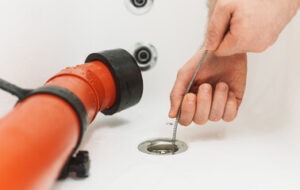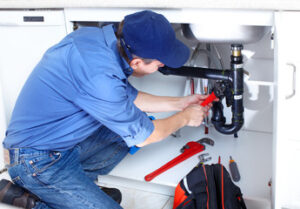Buckhead Plumbing is a system of pipes that conveys water for various building uses. Its role includes distributing drinking water, heating and cooling a building, and removing waste. It also involves the installation and maintenance of these systems.
Plumbers must have good manual dexterity and coordination to handle large pipes. They must also have analytical thinking and interpersonal skills to communicate with customers and other professionals.

Plumbing is the system of bringing fresh, clean water into buildings and removing waste materials. It involves a network of pipes that carry water to toilets, taps, showers, kitchens, and heating systems. It also includes drainage systems that remove sewage and rainwater. Plumbers are responsible for installing, repairing, and maintaining these systems. They must adhere to strict regulations and building codes to ensure safety and efficiency.
In addition to installing new pipes and fittings, plumbers inspect existing ones for leaks or blockages. They use a variety of tools and techniques to find and fix problems. They may use video cameras to inspect underground pipework, sewers, or hydrojetting to clear blocked drains. They can also install new appliances, such as dishwashers and washing machines.
A plumber’s job can be challenging, especially during busy periods when demand for their services is high. They may need to work overtime or even on weekends during these times. In addition, plumbing is a labor-intensive career, so the job’s physical demands can be tiring and uncomfortable. Plumbers must stand or crouch for long periods and may have to lift heavy objects.
The typical work schedule of a plumber is 40 hours per week, but they often have to work overtime during busy periods. They work in various settings, including offices, schools, hospitals, and retail stores. Some of these jobs require power tools, so it is important to follow proper safety precautions. Plumbers are also required to wear protective gear when working with these tools.
Most plumbers work on residential, commercial, or industrial properties. Some are self-employed, while others work for large construction companies. They can also work on construction sites alongside other tradespeople, such as carpenters and electricians.
There are many different types of plumbing systems, but they all serve the same purpose: to deliver clean, safe water to the people in a building. Some of the most common types of plumbing include potable water systems, sanitary drainage and waste removal systems, and fire protection systems.
A high school diploma is usually the minimum education required for a career as a plumber. However, some people may choose to attend a vocational school or trade college to further their knowledge of the field. Such schools often offer courses in pipe system design, welding, and other topics. In addition, they may provide on-the-job training and apprenticeship programs. An apprenticeship program typically lasts four to five years and offers hands-on experience working with experienced plumbers. The program also includes classroom instruction on local plumbing codes and regulations, blueprint reading, and safety protocols. During their apprenticeship, trainees earn a percentage of the wages of a journeyman plumber.
In the classroom, students learn math and basic plumbing skills such as blueprint reading and introduction to pipes, valves, and fittings. In addition, they take Occupational Safety and Health Administration (OSHA) safety training and first-aid certification. They also receive on-the-job training at the job site, where they work under the supervision of an experienced plumber and are gradually given more responsibilities.
Plumbers must have a strong attention to detail to work safely and efficiently. This is especially important when dealing with hazardous materials like sewage and high-pressure systems. Plumbers must also be comfortable working in tight spaces and climbing ladders. Finally, they must be able to lift heavy objects and move large pieces of equipment.
Some states and jurisdictions require that plumbers be licensed, which increases their job security and gives them access to better employment opportunities. While licensing requirements vary by jurisdiction, most require a specific number of years of on-the-job experience and an exam. In addition, some areas require additional certifications, such as those related to medical gas systems.
Plumbers can also become certified in plumbing by completing a certification program. Such programs are available at many vocational and technical schools and some community colleges. The Occupational Safety and Health Administration (OSHA) sets workplace safety standards for all professions, including plumbers. In addition to certification, some plumbers pursue advanced degrees in plumbing, which can improve their job prospects.
The salary of a plumber depends on several factors, including experience, education, and job location. Specialized skills and additional certifications can also increase earning potential. For example, plumbers with expertise in HVAC systems and sustainable plumbing solutions are typically in higher demand. Additionally, self-employed plumbers may earn a higher salary. However, self-employment can be challenging, especially for those unfamiliar with the industry’s business side.
Plumbers are also paid a higher salary for jobs in the oil and coal industry, where they must install complicated pipework and systems. These positions can pay up to $120,000 a year, depending on the complexity of the work. However, these jobs are often highly competitive and require specialized training and equipment. For this reason, these jobs are not suitable for everyone.
Another factor affecting a plumber’s salary is their ability to provide exceptional customer service. Satisfied clients will recommend and return for future services, which can lead to an increased client base and a higher income. Additionally, plumbing businesses can improve their earnings by implementing new technologies and providing 24/7 emergency services.
While the average salary of a plumber is relatively high, it can vary by state and region. States with larger populations and higher levels of construction activity tend to hire more plumbers, leading to a higher demand for their services. This makes it important for plumbers to research the local market before making a career decision.
Many plumbers are required to meet certain educational and licensing standards, which can impact their salary. Regulatory agencies generally determine these requirements and can change from one state to another. Additionally, some employers offer additional benefits and perks, such as health insurance and retirement plans, that can help offset the cost of labor.
In addition to salary, plumbers can also benefit from networking with fellow industry professionals and attending professional conferences. These opportunities can lead to job offers, referrals, and mentorship. They can also learn about emerging trends in the industry and find out what types of projects are most profitable. Lastly, plumbers can consider negotiating their salaries to ensure they get the best value for their work.
Plumbing is a skilled trade, and it can be a rewarding career. Plumbers can work in many environments, including homes, commercial buildings, and industrial sites. They need to have good manual dexterity, physical strength, and excellent analytical problem-solving skills. They also need to be creative when designing or installing plumbing systems.
Most plumbers train through an apprenticeship, combining classroom instruction with paid on-the-job training. Apprenticeship programs last four to five years and typically include 2,000 hours of on-the-job training. Apprenticeships are available through unions and state and national associations, and they can provide an excellent entry point into the field.
After completing an apprenticeship, a plumber can apply for a full-time job at a company. This position can be rewarding, but it can also be demanding. Plumbers often need to be on call to respond to emergencies, and they may work long shifts. Some plumbers also choose to become self-employed and work independently, which can be more rewarding than working for an employer.
Plumbers are exposed to various risks at their jobs, including chemical hazards and exposure to biohazards (including raw sewage). They may also be exposed to heat or cold, electricity, and noise. In addition, they may be at risk for musculoskeletal injuries, burns from hot equipment parts, and slips and falls in wet environments. Those working in the field need to follow safe work practices, such as using a face mask when handling hazardous materials and disposing of waste safely.
In addition to the job’s physical demands, plumbers also need good customer service skills. They must be able to listen to customers and explain technical information in a way that is easy for the customer to understand. They must also be able to work under pressure and meet deadlines.
In addition to these skills, plumbers must be familiar with industry standards and regulations. Plumbers should read plumbing blogs and attend workshops and conferences to stay current. In addition, they should join an industry association to increase their credibility and marketability.



